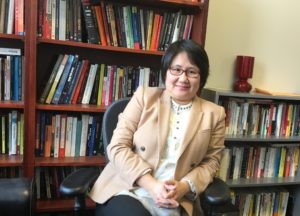In a special weekly series, the College of Liberal Arts is featuring a faculty member from one of our 13 departments. We asked questions about why they are passionate about the subjects they study and teach, and how they found their path to CSU. See all “Faculty Friday” features here.
Hye Seung Chung
Associate Professor, Department of Communication Studies
1. What do you research, teach, and/or study? What do you like most about it? What inspired your interest in these topics?
My research specialization can be broken into two main tracks: [1] the representation of Asians and Asian Americans in the U.S. media and [2] Korean/East Asian cinema. I came to the United States in 1997 to study classical Hollywood cinema, which was my passion since I was a kid. From an early age, I was drawn to MGM musicals, literary adaptations, and women’s films.
After taking up film studies as a graduate student at the City University of New York and later at the University of California at Los Angeles, my interest shifted and I became interested in studying film as a cultural text shaped by ideological forces of its time of production and reception. My first book, Hollywood Asian, follows the career and filmography of Philp Ahn, a pioneering Korean American actor who appeared in more than one hundred films between the 1930s and the 1970s. His villainous role in China Sky (1945), a Pearl S. Buck adaptation, had to be changed from Chinese to Korean because of America’s wartime policy prohibiting negative portrayals of allies.
I am interested in historicizing Asian representations in American popular culture in the larger context of U.S. foreign and immigration policy as well as industrial policy of censorship and regulation. My current book project is entitled Hollywood Diplomacy: Film Regulation, Foreign Relations, and East Asian Representations. I did archival research in both Washington D.C. and Los Angeles, comparing the government’s and studios’ documents about films depicting East Asian countries and ethnicities from the 1930s to the present. Ultimately, commercial Hollywood cinema is a product of compromises between industrial/commercial interests and political/diplomatic mandates—celluloid diplomacy, if you like, which inevitably is tied to the protection of lucrative foreign markets. I am intrigued by this balancing act and enjoy reconstructing film history through primary documents and textual analysis.
2. Which class is your favorite to teach and why?
I enjoy all my classes for different reasons, but I really like teaching classical Hollywood cinema to young students. I do that in multiple classes but History and Appreciation of Film (SPCM 354) is devoted entirely to the history of Hollywood. Young students don’t know how great American films were in the 1930s and 1940s and why that period is considered the Golden Age of Hollywood. It’s not simply because individual stars, directors, and films were fascinating. The tightly-controlled studio system was the biggest enabler of quality “product.” Everyone collaborated and compromised for the good of the collective and the quality/quantity of output during that period is truly stunning.
In my opinion, this is the most significant cultural heritage of this country. Young students should be educated in American film history and be proud just as their British counterparts perhaps are of Shakespeare and Dickens and French people are of Renoir and Monet. It is deeply satisfying for me to see my students learn about this period of American cultural history and come to appreciate such timeless classics as Trouble in Paradise, The Public Enemy, Mr. Smith Goes to Washington, Citizen Kane, Sunset Boulevard, The Searchers, Vertigo, etc.
3. What did you want to be when you were little? When did you know you wanted to go into higher education/research?
To tell you the truth, I never thought that I would become a professor. When I was little, I wanted to become a programmer of foreign films in a television station so that I could watch whatever classical Hollywood films I like! I became a public relations person after completing undergraduate college in Seoul, Korea, but soon realized that the corporate path was not what I really wanted.
I came to the United States to follow my dream of studying classical Hollywood cinema and to access cable movie channels such as TCM. But film studies really opened my eyes to the world, society, and politics as when I entered the field it had become politicized and cultural studies-oriented. It also enabled me to reconnect with my own heritage and I became a scholar of Korean modern history while studying and writing about Korean cinema.
I am very grateful that film education in the United States gave me a purpose in life and allowed me to teach my students about cultural and social issues of which they were previously oblivious. I often get comments from students about how my classes opened their eyes to what is really going on in the world around them. This is the biggest compliment that I can imagine.
4. What is one thing students would be surprised to learn about you?
Maybe not me in particular, but some students have a preconception of film classes being fun, easy, and carefree. Some students are surprised to learn that film studies is actually quite challenging, serious-minded, and complex. For example, this semester I am teaching an honors seminar on East Asian cinema and the second week’s screening was Black Rain, a Japanese film about the effects of the 1945 bombing of Hiroshima. We discussed difficult questions related to American culpability and moral responsibilities for this and other tragedies. Film can be a powerful tool to initiate profound conversations. I think students are sometimes surprised to see how deep and serious the class materials can be.